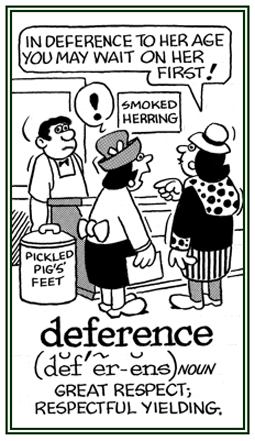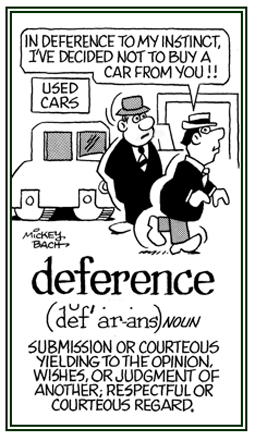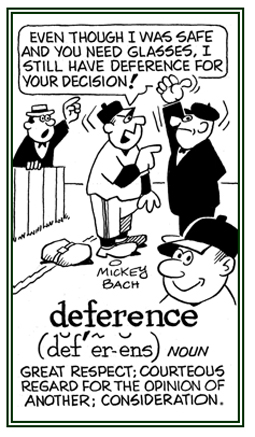defer
(verb), defers; deferred; deferring
1. Putting off (action, consideration, etc.) to a future time: The decision has been deferred by the company's president Mr. Hanson until next week.
2. To postpone the process of someone entering a branch of military service: Malcolm wanted to defer joining the military until after he had finished his high school education.
deference
(s) (noun), deferences
(pl)
1. Submission or courteous yielding to the opinion, wishes, complaisance, or judgment of another person: Jason noticed that his
deference to his supervisor, Mr. Anderson, appeared to please him.
2. Courteous respect; polite respect, especially putting another person's interests first: Clay was taught to show
deference to people who were as old as his grandparents.
 © ALL rights are reserved.
© ALL rights are reserved.
 © ALL rights are reserved.
© ALL rights are reserved.
 © ALL rights are reserved.
© ALL rights are reserved.
Go to this Word A Day Revisited Index
so you can see more of Mickey Bach's cartoons.
deferential
(adjective), more deferential, most deferential
Showing or expressing polite respect, courtesy, and consideration: Mrs. Johnson's history class listened with
deferential attention to another student's report about the lives of Roman gladiators.
The lawyers showed deferential respect by bowing to the judge as they were leaving the courtroom in London.
deferentially
(adverb), more deferentially, most deferentially
1. Respectfully and with esteem that is due a superior or an elder: Sarah's grandson spoke deferentially to her and to her friends when they visited her.
2. Affected or ingratiating regard for another's wishes in a servile manner: The fawning, flattering, and deferentially polite manner with which Uriah spoke to the supervisor, Mr. Johnson, tended to irritate her.
deferment
(s) (noun), deferments
(pl)
1. The act of putting off, or an instance of delaying, until a future time: Janice asked her new boss, Mrs. Anderson, for a deferment of one week before she started her new position.
2. Officially sanctioned postponement of compulsory military service: Roger received notice of his deferment by mail the day before he was supposed to have reported for duty in the army.
deferred
(adjective), more deferred, most deferred
1. Withheld, suspended, delayed until a future date: The reporters from the local paper waited all night to hear about the deferred decision that the judge would announce.
2. Classified as a temporary, or a permanent, exemption from being inducted into a military service: Horst was very disappointed when he read about his deferred acceptance into the marines until an additional medical examination was completed.
differ
(verb), differs; differed; differing
1. To be not the same; to be unlike: John just found out that the new version of the dictionary differs a great deal from the previous edition.
2. To have or express a different opinion; to disagree: Ted and Jane differed with each other as to where they would spend their vacation.
3. Etymology: from Latin differre, "to set apart".
difference
(s) (noun), differences
(pl)
1. A situation in which one person, or something, is not like another one: Jake's parents taught him the
difference between what is right and proper and that which is unacceptable or morally wrong.
Mary believes that the difference between grocery store produce and Farmer's Market produce is the freshness.
2. The degree or amount by which some things are not the same or what is left after subtracting one number from another number: There is a 10-year
difference between Jack's oldest daughter and her youngest sister.
3. A situation in which there is a divergence of opinion or direction that should be undertaken: The city councilors had several
differences with Mr. Richison, the mayor, about how the parade for the summer festival should be organized.
different
(adjective), more different, most different
Descriptive of that which is incompatible, distinguished, or unusual: The sisters had very different hair styles, manner of dressing and speaking to such a degree that it was hard to imagine that they were actually twins.
differentia
(s) (noun), differentiae
(pl)
The quality or condition that distinguishes one species from all of the others of the same genus or class: The most common differentia between felines is their size and their compatibility to live with humans; such as that which exists with lions and domestic cats.
differential
(s) (noun), differentials
(pl)
1. A series of gears in a car, a truck, etc. that allows for the rear wheels to turn at different rates; such as, for turning a corner: After the accident, Sandy had to replace the
differential in his truck because it was damaged.
2. The distinguishing degree of not being similar to another person or items: There was a considerable
differential in salaries between the newly hired salespeople and the those with years of experience.
Although there was an obvious price differential between the two cars, Samuel and Gertrude decided it was worth it to get the one that had more safety features.
differential
(adjective), more differential, most differential
Descriptive of the distinction among items or people: The most differential characteristic between the two automobiles was the finishing of their interiors because one was finished in cloth and the other was designed with leather.
differential diagnosis
(s) (noun), differential diagnoses
(pl)
Knowledge that is acquired by considering the probability of one disease compared to the likelihood of some other diseases that might be responsible for a patient's illness: The differential diagnosis includes considering a runny nose, an allergic rhinitis (hay fever), the abuse of nasal decongestants, and a common cold to see if there are any connections between any of them.
differentiate
(verb), differentiates; differentiated; differentiating
1. To make something, or someone, not like others of the same kind: The color of their eyes is one thing that
differentiates Mary's twins from each other.
There is little to differentiate one dictionary from another one because they all tend to have the same or very similar definitions and too often lack clarity because they use another form of the word that is being presented.
2. To identify that which sets one thing apart from something else; to tell one thing apart from another based on characteristics: For some people, including Janet and Linda, it is not easy to
differentiate between ice cream and frozen yogurt.
differentiated
(adjective), more differentiated, most differentiated
1. Descriptive of something that distinguishes or separates one thing from another one: The
differentiated markings on the wings of the brown butterfly identify it as a local insect, not a migratory one.
2. The similarity between a normal cell and the cancerous cell defines what degree of change has occurred: Cancerous cells that are well
differentiated are close to the original cells and are usually less aggressive.
Poorly differentiated cells which have changed more and are more aggressive.
Cross references of word families related to "bear, carry, bring":
duc-;
ger-;
later-, -lation;
phoro-;
port-.





